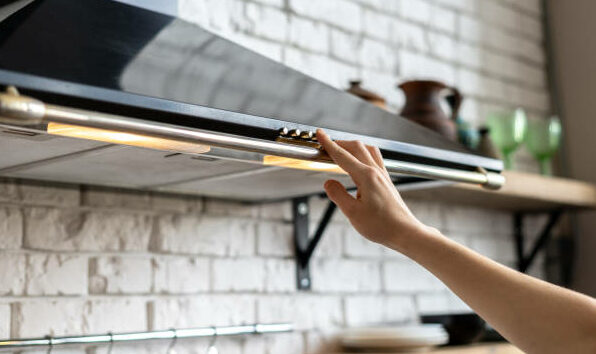
Strangely, kitchen hoods make sounds other than the fan. Even when the hood is not working, no noise should come from the appliance. But sometimes you can hear noises coming from your cooker hood even when it is not working.
Why? When the cooker hood is not working, it makes noise because of the weather outside. Wind and rain can cause noise in the hood’s exhaust vent, which can be brought inside through the ductwork. If your range hood makes noise, especially when it’s raining or windy outside, it’s easy to fix it with a few small changes.
There can be more than one reason for a noisy hood when not in use, but the most common is wind. Follow us to find out how to fix this problem and make your kitchen as quiet as possible.
When there is wind, the check valve is triggered by the wind and then lowered again. This makes the range hood noisy. Depending on where the wind is coming from and how strong it is.
Table of Contents
How to Fix a Noisy Exhaust Fan in the Kitchen?
It’s a fairly common problem. Most likely, the event has a flap that can be moved and closed when the exhaust fan is not running. It keeps birds out. (This is where swallows like to nest.)
You can try adding dots of felt or soft silicone to make them quieter. The shutter could then operate without making so much noise.
Ventilation damper often open when there is a strong wind, causing them to close occasionally. If the noise is driving you crazy, you should get new anti-reverse shock absorbers with springs. Find out the size of the vent pipe and order the registers from a company that sells ductwork. First, replace the check valve, which sits just above the hood. If that doesn’t solve the problem, place a second damper near the wall or roof cap where the water exits. With the seconds shock, the problem will be much less noisy.
Possible Causes of a Noisy Exhaust Fan
The outer vent makes a loud popping sound.
First, you need to know where the noise is coming from. If your range hood becomes noisy when it’s windy, the problem is likely to be the outside vent. The vent has a non-return valve that helps vent air out of the room. Unfortunately, you can’t get rid of them because the dampers prevent insects and other objects from entering the vent. Putting a piece of foam between the gap is the best way to keep the wind from flapping the hood dampers.
The hood makes noise when it rains
Rain is another pick that can make noise in your hood. When it rains, water drips down the vent and the sound echoes through your kitchen. You can prevent your range hood from making noise when it rains by placing insulation around the ductwork. Insulation that can withstand weather and dust and can also block noise that is harmful to the case. But this method is not recommended and only homeowners who can afford to have the entire duct insulated will choose it.
How Quiet My Range Hood Should Be?
At full throttle, a range hood is considered quiet if it emits between 4 and 5 sones, or 40 to 65 dB. This means that at a slow speed it will be much quieter, so you can be sure it won’t make annoying noises.
Keep in mind that cubic feet per minute (CFM) is also a big part of the hood sound level. CFM is a way of measuring how much power a range hood needs to remove smoke and odors from the kitchen.
If a range hood has a high CFM, it will also be noisy. But that doesn’t mean you should choose the lowest CFM you can find.
It is best to get a range hood of at least 600 CFM to ensure that it operates quietly and efficiently. People who often cook fatty foods get 900 to 1200 CFM. Most range hoods with this CFM make between 7 and 8 sones of noise, which isn’t too loud.
Conclusion
Look at the hood yourself before calling a professional. Most repairs for noisy range hoods are simple and can be done by anyone. But if the problem persists, it means that it should be fixed properly. Then you will need to get professional help.
